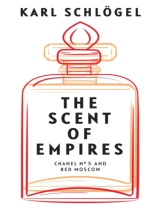Can a drop of perfume tell the story of the twentieth century? Can a smell bear the traces of history? What can we learn about the history of the twentieth century by examining the fate of perfumes?
In this remarkable book, Karl Schlögel unravels the interconnected histories of two of the world’s most celebrated perfumes. In tsarist Russia, two French perfumers – Ernest Beaux and Auguste Michel – developed related fragrances honouring Catherine the Great for the 300th anniversary of the Romanov dynasty. During the Russian Revolution and Civil War, Beaux fled Russia and took the formula for his perfume with him to France, where he sought to adapt it to his new French circumstances. He presented Coco Chanel with a series of ten fragrance samples in his laboratory and, after smelling each, she chose number five – the scent that would later go by the name Chanel No. 5. Meanwhile, as the perfume industry was being revived in Soviet Russia, Auguste Michel used his original fragrance to create Red Moscow for the tenth anniversary of the Revolution. Piecing together the intertwined histories of these two famous perfumes, which shared a common origin, Schlögel tells a surprising story of power, intrigue and betrayal that offers an altogether unique perspective on the turbulent events and high politics of the twentieth century.
This brilliant account of perfume and politics in twentieth-century Europe will be of interest to a wide general readership.
表中的内容
List of illustrations
1. Extracurricular activity
2. The scent of the empire, or how Le Bouquet de Catherine from 1913 led to Chanel No. 5 and the Soviet perfume Red Moscow after the Russian Revolution
3. Scentscapes. Proust’s madeleine and historiography
4. When ‘the weakest link breaks in the imperialist chain’ (Lenin). The world of scents and the olfactory revolution
5. Departure from the belle époque and clothes for the New Woman. Chanel’s and Lamanova’s double revolution
6. Chanel’s Russian connection
7. French connection in Moscow? The ‘fatherland of workers’ and traces of Mikhail Bulgakov
8. Auguste Michel’s incomplete project: a Palace of Soviets perfume
9. The seductive scent of power. Coco Chanel and Polina Zhemchuzhina Molotova. Two careers in the twentieth century
10. From another world. The smoke of the crematoria and the smell of Kolyma
11. After the war. Man cannot live on bread alone. The New Look and Stilyagi
12. Excursus: The grande dame of German film Olga Chekhova, cosmetics and the dream of eternal youth
13. How One World smells
14. Not only the Black Square: Malevich’s perfume bottle
Notes
Bibliography
Index
关于作者
Karl Schlögel is Professor of Eastern European History at the European University Viadrina in Frankfurt. His book Moscow 1937 was awarded the Leipzig Book Prize for European Understanding in 2009.












